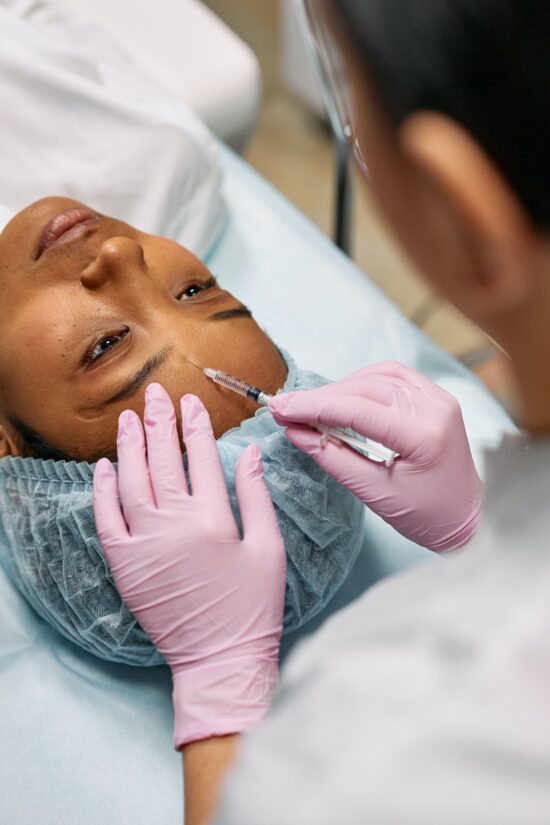Botox injections are well known for erasing the signs of aging. Botox treatment is also an effective treatment for chronic migraines, excessive sweating, cervical dystonia, and bladder control. While cosmetic use is the most popular choice, Botox as a way to treat depression symptoms is now being added to the list of the many amazing things botulinum toxin can do to improve your life.
If you want to alleviate depression and improve your appearance, Botox may be the answer. Over 4.4 million treatments of botulinum toxin were administered in 2020, a safe and effective way to help you get the results you deserve. These results go deeper than the surface and may be the key to the changes you seek in finding joy in your life.

Why Botox May Help with More Than Aesthetics
Botox injections have been studied for some time now, and they can do much more than erase the signs of aging from your face. Botox can help ease migraines, uncontrollable blinking, bladder issues, sweating, and depression too.
Botox works by weakening specific muscles at the injection site. It can block certain nerves as well. Since the World Health Organization estimates that over 264 million people suffer from depression around the world, this is exciting news for a safe and effective treatment.
Common treatments for depression aren’t as effective for a large segment of those suffering from this condition. Even when they follow doctor’s orders, take the medications and stick to the treatment plan, depression can still reign over them.
If antidepressant medications aren’t working for you, Botox can help you through more than cosmetic purposes. Most people that use Botox for depression are pleased with the results, both with mood and appearance.
While the graphic below shows that aesthetics still dominate the main reason why patients seek Botox treatments, a trend of growth in using it beyond smoothing skin is apparent. With the growing research out there about what Botox can do, especially with the latest studies on its benefits for those facing major depression, it may be something that can help you too.

Can Botox Help with Depression?
Botox treatment may help with major depressive disorder, a theory that is backed by ideas that stem from the 1800s. While clinical trials of today are bringing these theories more credibility, it is important that patients facing depression get a medical evaluation first and look at all treatment options.
If you’re wondering how something that controls facial muscles can help patients with major depression, studies reveal that Botox treatments can make it hard to frown. The idea is that eliminating negative emotional feedback that is signaled with a frown makes it hard for the brain to get this message.
In short, facial wrinkles and antidepressant effects can be found through Botox, creating another option for those with depressive symptoms. Pharmacy and pharmaceutical sciences have created an awakening of possibilities through randomized control trials that reveal Botox can be especially helpful in this application, particularly for those that can’t tolerate the traditional medications usually prescribed for treating these negative emotions.
The research is exciting since it lends credence to Charles Darwin’s theory that physical expressions of emotions like smiling or frowning send a signal to the brain to create an emotional experience. As such a frown could intensify the feelings of depression, and hindering that frown could be the secret to boosting positive emotions in the brain.
How Does Botox Influence Mood and Depressive Symptoms?
In modern times, it seems that the notion to use a Botox injection for patients with major depression came from a 2006 clinical trial. Each of the 10 participants in the trial were given Botox injections in the glabellar frown lines, the ones that show up between the eyes when you frown.
After two months, the primary outcomes showed that 9 of the participants no longer had symptoms of depression. The 10th person in the trial no longer had a depressed mood.
A mere six years later, a study of 30 people showed a significant difference in mood. The placebo group noted a small reduction in symptoms but those that had the Botox injection in the control group had a significant effect, revealing that a single treatment could provide the desired results in as little as six weeks.
When looking at Botox versus placebo, researchers needed to be sure that Botox injections were responsible for these antidepressant effects. The botulinum toxin was again administered into the injection site at the glabellar frown lines in a 2014 study of 30 participants.
In this particular randomized controlled trial, the findings were incredibly significant because the cosmetic effects of Botox last for roughly 12 to 16 weeks, but those with major depressive disorders reported that their symptoms improved even after 24 weeks.
How Botox May Help Relieve Major Depressive Disorder
With botulinum toxin, you may be able to find relief in a number of ways that are backed by these scientific studies. Since botulinum toxin type A (BTA) brings a cosmetic effect, this can indirectly lead to improved mood.
Additionally, the decrease in muscle activation also decreases the nerve signals back to the brain which reduces your negative emotional feedback. Botulinum toxin itself also directly affects the brain and emotional processing. This cosmetic treatment is one that can benefit you from the inside out when you resolve facial feedback while also helping to ease depression.

Side Effects of Botox Compared to Antidepressants
With a systematic review of studies that show the antidepressant effect botulinum toxin can have for an improved mood, it’s also important to know the side effects. For Botox, side effects may include discomfort, swelling, and bruising at the injection site. This is fairly normal and usually disappears soon after the treatment.
Other side effects that you may experience are headaches, droopy eyelids or brows, and flu-like symptoms. Some Botox patients may have dry eyes or the opposite effect with an increase in tears.
Then again, those that received Botox injections and didn’t take antidepressants can avoid the side effects of those medications. These can include fatigue, weight gain, insomnia, nausea, sexual dysfunction, and increased appetite.
How Is Botox Done?
Facial expressions could hold the key to taming depression symptoms. For this reason, many depressed and nondepressed subjects are likely to consider Botox as the way to effective treatment.
Before you get Botox for depression, you should speak to your doctor about your current medications and have an evaluation. As promising as the results are, you do not want any adverse effects by suddenly stopping any medications. Before you schedule your Botox appointment, you should make sure it is right for you. The findings are considered statistically significant, meaning that Botox could help you relieve the symptoms of depression.
Steps for Botox as a Depression Treatment
At your Botox appointment, it will start with cleaning your face. This will be done with an alcohol wipe to sanitize the treatment area first.
After the injection sites are cleansed, you will receive your Botox injection. It will be placed into the facial muscles that reside between your eyebrows.
The Botox will soon start to take effect, preventing your muscles from sending that mood feedback to your brain. When you can’t make that facial expression through the frown lines between your eyes, it will start suppressing your depression.
On top of that, you’ll have a more well-rested and youthful appearance. While that will last between 12 and 16 weeks, the mental health benefits of Botox will last longer.
Signs of Severe Side Effects
Even though a systematic review of Botox has found it to be safe and effective, there are rare instances where it can cause severe side effects. Muscle weakness, vision changes, breathing difficulties, problems speaking or swallowing, and loss of bladder control are on the extreme end of these adverse events.
While that list does sound intimidating, it is important to remember that these side effects are extremely rare. Still, you will want to speak to your doctor about using Botox to treat a major depressive disorder. It can be an effective way to help you ease your depression and get back to enjoying life.
As a side bonus, it will also leave you with a more youthful appearance that can certainly help improve your mood.
Where to Get Botox for Depression in Miami
In Miami, those that want to look and feel their best through Botox treatments flock to Vida & Co. Our professional team knows just how to put you at ease in our soothing setting, allowing you to relax and get the treatments you need.
Botox can help smooth over those lines that are aging your appearance while also helping to improve your mood. Along with other fillers and treatments, you’ll find everything you need to find the ultimate joy in your South Florida lifestyle.
Visit us today to find out how Botox can help you restore a youthful look and help you with depression too.